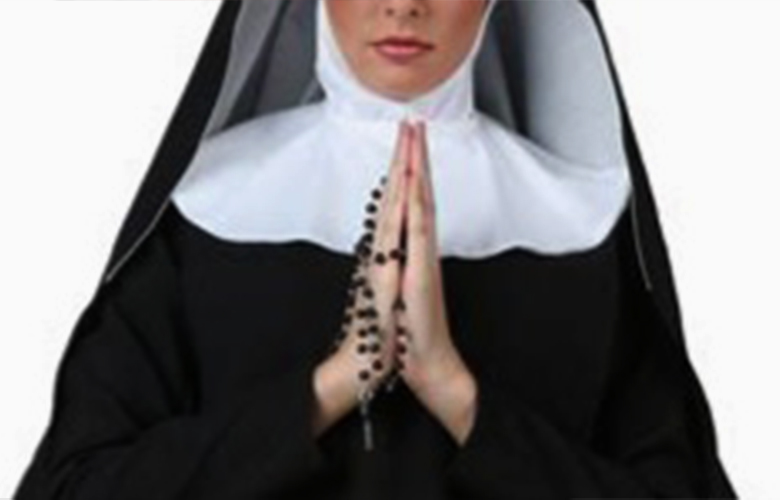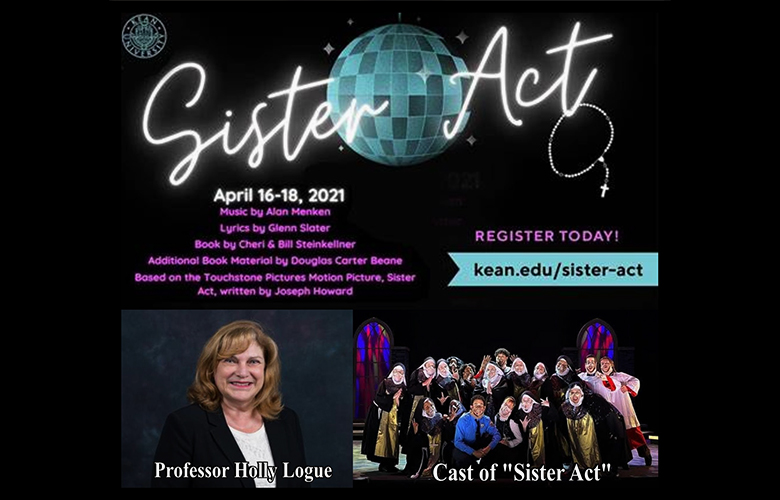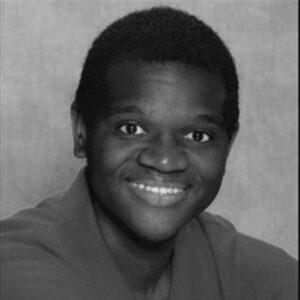
Pivoting is a word the whole world is annoyed by at this time, but it is a word we all need to get used to, along with change. The Arts world has had to pivot more than anyone else. They went from virtual play readings, virtual performances, to zoom/skype interviews, and to virtual festivals. Professor Holly Logue, the director of Kean Theatre Conservatory at Kean University, located in Union, NJ, had had to pivot many times, but not like this. She recently, with the help of an amazing staff, crew, and cast, had to rethink how to produce their production of “Sister Act.”
What was originally supposed to be a concert of the music from “Sister Act,” she soon realized she had to find a way to do the show differently. As a streamer of the show (me), they did an amazing job from sets to costumes, lights, sounds, hair, and of course performance. Filmed in two days and streamed in three, the final product was worth the many problems faced privoding (pivoting and producing at the same time) this production. Professor Logue took some time to answer a few questions I had for her.
1. When did you discover theater?
This question makes me smile, for I was a child, playing the role of George McGovern in a grammar school mock election. The competing “candidates” were Richard Nixon and Hubert Humphrey. Though Nixon won the actual election, McGovern won the school election. I still remember pieces of the campaign speech that led to that win!
Following that, I found myself enjoying involvement in any opportunity within my schools, and later a friend introduced me to a youth theatre that was truly formative. I played lots of wonderful roles and deepened my love for and understanding of theatre.
2. When did you first realize that directing was a passion?
In college, in Toronto, Canada, I directed a small production of Israel Horowitz’ play Rats. I found myself really enjoying the character work, envisioning staging, and experiencing the process of directing. The funny thing is that I don’t recall the performances at all – only the rehearsal process. Ultimately, my experience as a musical theatre performer led to my directing most of the musicals once I was hired at Kean University.
3. As a professional actress/director and theater professor, what caused you to follow your passion regardless of the difficulties of getting into show business?
There are many things. The first is that I never really imagined myself doing anything else. I had great experiences, teachers, and opportunities growing up such that I developed a level of confidence that made me think I could compete. It was in graduate school, however, when one of my professors quietly tapped me on the shoulder and said “if you decide you don’t want to enter the rat race in New York, you have the qualities of what would be a wonderful teacher.” He was very kind and thoughtful in observing each of his students and noticing their assortment of skills. I had not been thinking about teaching at the time, but soon thereafter an opportunity came my way to teach at Seton Hall while I was still in graduate school. I took advantage of that opportunity and found that I really loved being in an academic setting.
My life has been very full and I’ve been especially lucky to have been afforded so many terrific opportunities as a performer, a teacher, a director, and an administrator.
4. During the beginning of the pandemic when classes were online, how did you deal with classes such as, Theater Tech, Costumes, Make-Up, etc? Were they cancelled?
Great question. Some of our courses were deferred to the Spring 21 semester because they rely on in person practical teaching, but several that are related to technical theatre (costume construction, technical theatre production) were taught on Zoom using close-up cameras so the students could see what the professor was doing. Makeup was taught using a series of professor created videos, and it was very effective because the students obviously cannot apply makeup with a mask on.
5. Are you continuing to have classes at Kean or is everything online?
In FA 20, after the first 4 weeks, we had some classes that met face to face in masks with social distancing, regular testing, and temperature checks as well as an app that asks the user to answer the typical Covid health questions and submit their response. In Spring 21, many more classes were offered Face to Face, again, with all of the protocols mentioned above.
6. You recently directed, produced and filmed the Broadway musical, Sister Act. What interested you about this musical that caused you to choose it?
I saw a production of it once, and when trying to select a play that might work well for a concert version, which it was to have been, I felt it would be a good fit for the Kean student body. The cast is diverse, the music is wonderfully fun, and the story is strong.
7. What were your initial plans when deciding to film it instead of having a limited audience?
We were not given an option of allowing any audience at all. No Kean events have permitted live audiences. Following the state and local guidelines, we are lucky to have been able to produce it with in person rehearsals. We asked if the cast and crew could be tested weekly, like the athletes are, to allow them to participate in the live rehearsals.
8. What challenges did you encounter in producing this show with the health regulations in place?
There were many challenges. First, the day after our auditions concluded, one of our actors reported having tested positive for Covid-19. That meant we all had to quarantine for 10 days, moving our rehearsals to on-line for the first week or so. Learning about the positive result, the faculty met to discuss whether our goal to produce this at all on stage would be possible. We made a decision to go virtual, feeling it would be the safest choice, but a day later, at the cast’s urging, we reversed the decision and made a commitment to try to rehearse and perform live, with the understanding that if we experienced another set-back, the project would not be able to go forward. Time would not allow us to pivot if the cast or crew did not adhere to the stringent covid guidelines we put into place.
Other challenges include the design of clear masks that would allow us to see the actors faces more than a cloth mask. However, the clear masks that exist do not provide a closed seal around the face that would prevent the spread of aerosol droplets from escaping. So, our costume faculty member created custom masks that included fabric attached, so as to prevent that from happening.
There are so many challenges we faced, including the fact that we are not a film department and we do not own the sort of equipment that would be required – nor do we employ faculty or staff with film expertise. Despite that, our faculty and staff learned how to make it work.
9. What have you learned from this new experience?
I have learned more about directing for film and I’ve learned more about the features of Zoom webinars.
10. What were the perks of producing the “pandemic way” as opposed to having a live show?
I cannot think of any perks of producing the pandemic way, but presenting something on film allowed us a broader reach in terms of audience. That’s a wonderful thing.
11. What were the downsides of not producing a live show?
The cast didn’t get to experience the synergy between the audience and cast. They got no chance to continue developing their characters through a week or more of performances. They didn’t get to perform the show from start to finish without stopping. With filming, we had to stop after nearly every scene for editing purposes, and we did not film in order.
12. There was no formal set built. Mostly backdrops were used. What other changes did you make in producing this show?
Actually, there was a set built. There were a series of platforms constructed for this show as well as a series of cathedral style gothic windows. Between the center windows was a large projection screen that provided further details as to location and “feel”. I would say that this isn’t something I would consider a change per se, for every time we create a production, it is our opportunity to design and direct based on our concept of the piece. It is not our job to re-create a Broadway or other scenic design, costume design, choreography, staging, etc.

13. Did you receive a good response in ticket registration?
I would have liked a larger audience to see this – as everyone worked tirelessly and the result was good! Publicity is something we often struggle with. I too often hear; you are a well-kept secret. We would prefer not to be a secret!
14. When live shows reopen, would you consider reworking the concept to have the live shows live streamed to ticket holders only?
Preparing a production for film is quite a lot different than for the stage. What we might be able to do is set up a camera in the theatre behind the audience and simply stream the performance. We have done this before, particularly for friends and family of the cast members who may not be able to attend.
15. For your theater knowledge and just for life lessons, what take-away did you get from “pivoting?”
Nothing is insurmountable.
16. If you could have lunch and conversation with any theater director, dead or alive, known or unknown, who would it be and why?
Well, the one director I had most wanted to meet, I did meet – Harold Prince. It was about a year before he passed away, which makes the meeting that much sweeter. We had hired his associate director, Dan Jutner, to direct a production of PARADE for us here at Kean, and during that semester, Dan was away directing Evita in Australia, so Hal was his “substitute” for a class session. Several students and I trained into the city to his office and sat with him in his office for over 3 hours. It was very personal, very intimate.
Another director I would love to meet is Trevor Nunn. With our frequent trips to London and Stratford, I have always appreciated his genius with the Royal Shakespeare Company.
Theater and the Christmas Season
“Booking It”: A Conversation with Dane Reis


Casey Bell is an author, playwright, screenwriter, poet, and A.S.C.A.P. songwriter. As an author he has published over twenty books in multiple genres from poetry to children to horror to non-fiction to young adult. His latest work, American History is a children's book series. He has also authored many plays one of which has been produced three times, twice for the stage and once as a play reading for YouTube. He has also produced a short film for YouTube. Casey Bell is also a member of A.S.C.A.P. as a songwriter. His motto in life is to be as unique as your fingerprints.
Read Full Profile© 2021 TheatreArtLife. All rights reserved.

Thank you so much for reading, but you have now reached your free article limit for this month.
Our contributors are currently writing more articles for you to enjoy.
To keep reading, all you have to do is become a subscriber and then you can read unlimited articles anytime.
Your investment will help us continue to ignite connections across the globe in live entertainment and build this community for industry professionals.